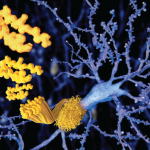However, the researchers draw an important distinction between conventional synthetic (cs) DMARDs, such as MTX, hydroxychloroquine and sulfasalazine, and biological DMARDs, which include etanercept, adalimumab, infliximab, certolizumab, golimumab, abatacept, rituximab and tocilizumab. The latter were not associated with a higher risk for dementia, but those receiving the csDMARDS had a 1.63-fold higher risk of dementia.
Possible mechanisms for this result may relate to folic acid depletion or altered hippocampal brain amine levels, the researchers say. “A broad-scale prospective clinical trial should be conducted to discuss how the gut–brain connection leads to dementia in patients with RA who are treated with csDMARDs.”
A number of possible explanations could exist for the different conclusions of the two studies, Dr. Edwards notes. “It could be due to differences in the design of the studies and, in particular, the case-control study design they use vs. our work that uses a prospective cohort study approach.” Differences in biology could exist in different populations around the world. “That would be fascinating and could lead to a better understanding of how dementia develops,” he adds. “Trying to explain differences is always good for the science.”
Evidence exists that dementia is at least in part an inflammatory condition.
Dementia Implicates Inflammation
“We know some dementia is vascular and likely to be aggravated by inflammation,” Dr. Edwards says. “We also know we have these powerful and potent rheumatologic medications that target inflammation. When you see that methotrexate lowers the risk of cardiac disease, it makes sense to ask what other things it might help. If inflammation is important for these other conditions in the general population, we know it will happen faster in patients with RA, providing fertile ground for testing what’s going on,” he says.
“There’s a lot of evidence to suggest that chronic inflammation is bad for us in many parts of our body. Part of this is a consequence of living longer, but the key for researchers is to find a way to switch it off,” Dr. Edwards says. “It’s too soon to know what, exactly, methotrexate is doing in this context. There are so many variables. The lowered dementia risk we found may be the result of less vascular disease in RA, mediated through its reduction of inflammation. What makes me hopeful is that the story just makes sense, based on the cardiac model. The background is so strong. Now it’s time to collect more data with bigger, Phase 3 studies.”

